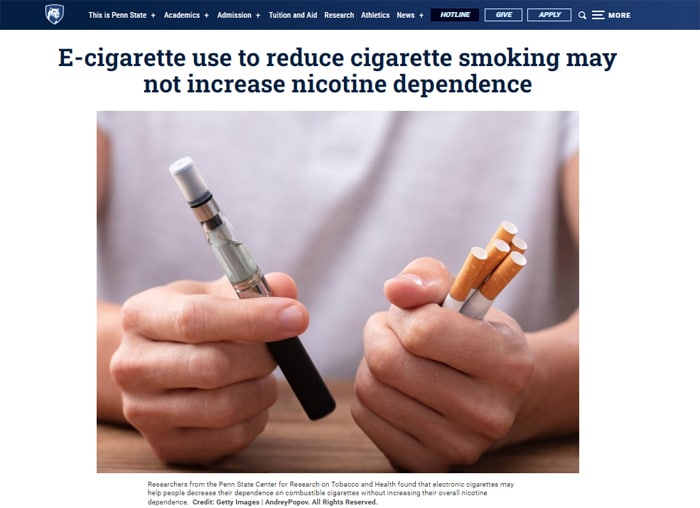A Penn State College of Medicine study has been published which investigates if vaping helps smokers to quit without increasing Nicotine dependence.
You can read the full manuscript here – Oxford Academic Nicotine & Tobacco Research.
Aims and Methods
The study evaluated over 6 months the nicotine dependence of smokers and vapers.
520 smokers took part and were put into one of 4 sub-groups depending on what method they were given to use to reduce their smoking…
- 36mg nicotine strength e-cigarettes
- 8mg nicotine strength e-cigarettes
- 0mg (nicotine free) e-cigarettes
- Cigarette substitute.
All participants were required to reduce their cigarette smoking by 75% by the end of the first month.
The Penn State Nicotine Dependence Index (PSNDI) was used to measure the dependence on nicotine from all sub-groups.
Also Urine tests were used to measure total nicotine exposure.
Results
The baseline average of cigarette consumption was 17.3 per day and the mean PSNDI score was 13.4.
Those using the e-cigarettes reported significantly lower PSNDI scores compared with the average and cigarette substitute group.
The 36mg nicotine strength group reported a higher dependence rating at 6 months compared with the other e-cigarette groups.
Conclusion
Basically those using the e-cigarettes during the study have reduced cigarette dependence without increasing their total nicotine exposure level.
All participants in the e-cigarette group reported significant decreased cigarette consumption – again showing that vaping is a viable method of quitting smoking.
The study says the following…
“Initiation of electronic cigarette use while continuing to smoke could potentially increase nicotine dependence. In this randomized trial aimed at helping smokers to reduce their cigarette intake, we found that use of an e-cigarette was associated with a reduction in cigarette dependence and an increase in e-cigarette dependence (in the condition with the highest nicotine concentration only), with no long term increase in total nicotine dependence or nicotine exposure.”
Hopefully this will help put to bed some of the crap being spouted about vaping being more addictive than smoking. Also vaping to quit smoking does not increase nicotine dependence unless using a very high level (36mg) of nicotine – even at that level the dependence was lower than with standard cigarettes.
Jessica Yingst – assistant Professor of Public Health Sciences and Penn State Cancer Institute researcher said the following…
“Our results suggest that using e-cigarettes or a cigarette substitute to reduce cigarette consumption can result in a reduction of self-reported cigarette use and dependence,”
“Importantly, use of the high concentration e-cigarette did not increase overall nicotine dependence, and was associated with a greater reduction in cigarette smoking compared to the cigarette substitute.”







